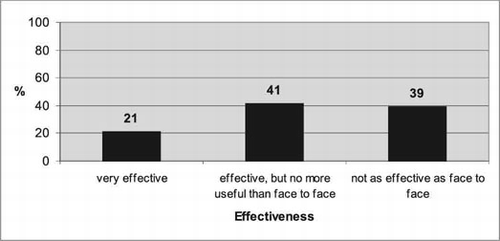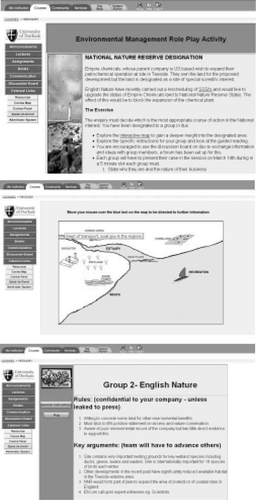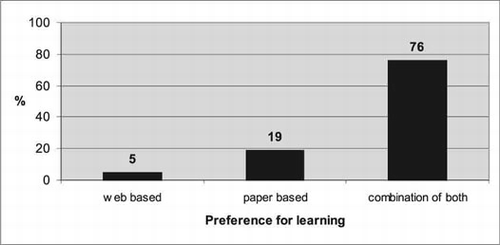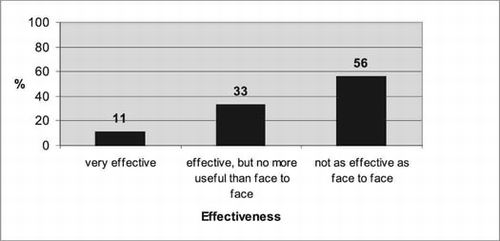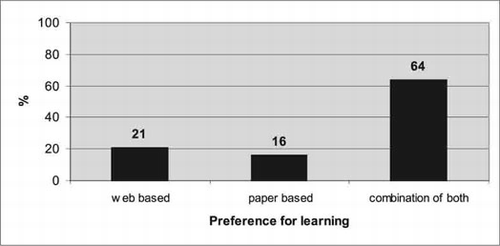Abstract
Role play can be a useful mechanism for student learning when the pedagogic aim is to get students to apply their knowledge to a given problem, to reflect on issues and the views of others, to illustrate the relevance of theoretical ideas by placing them in a real-world context, and to illustrate the complexity of decision-making. One of the principal benefits of using role play is to motivate students to take an active part in the learning process and this is usually achieved by designing a game in which students are encouraged both to cooperate and compete. This paper describes a role-play exercise designed to simulate how a Government might address a conflict between nature conservation and industrial development. Students are asked to assume the roles of different stakeholders and to present their case to a mock public enquiry. In this way it is hoped that students will work within designated guidelines to research environmental management issues and develop knowledge about their assumed organisation’s remit. This article provides an overview of the role play exercise and the use of a VLE to facilitate the exercise and presents student evaluation material. Finally, it concludes by offering other practitioners in the GEES disciplines some recommendations, should they consider implementing a similar exercise at their own institution.
Introduction
The use of role play and simulations in learning and teaching is not uncommon (e.g. CitationWalkden, 2000 and CitationHarrison, 2002). The benefits of such exercises to students include: researching a problem, having exposure to real-world scenarios, simulating the decision-making process, appreciating the views of others and working as part of a team.
However, there are also problems in running such exercises. For example, to work well, role play participants need sufficient time to research their own roles and responsibilities as well as those of other players, and to develop an understanding of the many issues involved. For example, in our exercise described below, which simulates a Public Enquiry in environmental management, students need to understand how an enquiry works and how the outcome is judged.
The role play was conducted as a formative exercise within a level 2 elective module in Geography entitled ‘Environmental Management’ over a three week period. The learning outcomes of the module include an expectation that students should be able to demonstrate knowledge of some important case studies in sufficient depth, to discuss and evaluate relevant peer review papers on the subject and to evaluate environmental management problems in a critical way. The role play exercise is designed to address these objectives in part by enabling students to reflect on complex issues and the opinions of others, to gain an understanding of environmental legislation and the role of key institutions, and to enable students to apply their current knowledge of environmental management to a ‘real-world’ scenario.
Having now run the role-play exercise three times with class sizes of between 70–90 students, it was felt that the experience did not engage all the students; enthusiasts tended to lead the groups and many others felt excluded and disappointed. On the other hand, students expressed annoyance when their peers chose not to contribute, feeling that too much pressure was placed on them to carry the ‘free-riders’ (See CitationLevin, 2002 for advice on how to deal with free-riding in group work - Ed.). Also, in previous years, only a short amount of time (< 10 mins) per student was permitted for them to present their individual cases at the Public Enquiry which meant that time-keeping became a real problem. In short, most students would have liked more time to research their role and to develop their arguments.
In recognition of this, the module leaders set out to improve the exercise, taking on board the comments and concerns of current and past students.
The use of a VLE and its pedagogic significance
In 2002, staff in the Department of Geography at the University of Durham developed the existing role-play exercise by using the Blackboard™ Virtual Learning Environment (VLE) software, to (1) address staff concerns over student participation and student preparation time and (2) to take advantage of the ability of the software to provide access to online sources of information, group discussion boards and e-mail communication among participants.
The software makes possible the creation of a virtual world that can be explored through a virtual map, photographs, diagrams, web links and resources. It is this functionality that enables the students to engage with the case material, and with each other, at a deeper level and in a novel way. Sharing ideas in this way also overcomes the problem of groups being deterred from physically meeting due to group size (75 – 100 students) posing logistical problems. Finally, it is also important to note that developing students’ understanding of environmental management legislation and the workings of a public enquiry might normally be quite difficult (and boring!). However, the students in this exercise are able to learn about the legislation through more efficient and enjoyable methods (see next section).
Prior to the implementation of the exercise using the VLE, the materials were distributed via paper in the form of an instruction sheet, which included a reading list and guidance towards web sites. Using a VLE enabled the following:
Web links;
Library links;
A communication area;
An Interactive map to provide the geographical context.
The following screen shots provide some idea of the VLE end product
Evaluation of the Exercise and the VLE
The role play exercise has been run using the Blackboard VLE for two years in 2002 and 2003. The paper-based evaluation was carried out in the final face-to-face role play session with a response rate of 68% in 2002.
In 2002, the students considered the exercise to be a worthwhile experience; they engaged well with the materials and were able to formulate and exchange their ideas via the discussion board. This ensured that the Public Enquiry discussion at the end of the role play exercise was lively and informative. A sense of competitiveness, ownership and enthusiasm emerged from the allocation of groups to specific roles (and therefore specific resource areas within the VLE).
Although the students engaged well with the materials, they felt that the exercise was a lot of work for something that was not being formally assessed. In addition, as shows, most students in the 2002 cohort (76%) preferred a combination of both VLE-based and paper-based learning materials. However, only 44% of students considered the VLEs discussion board as being as or more effective than face-to-face discussions ().
Furthermore, 35% of the students found the overall role play exercise either useful or very useful for exchanging ideas and information with other group members, 9% feeling that the exercise had greatly assisted in their learning and 84% that it had assisted to some extent. 80% recommended that supporting materials should be developed as web pages similar to this in other modules.
So, overall in 2002 (the first year of running the exercise through a VLE), feedback from the students was generally encouraging. However, several points were raised from the evaluations including:
The need to encourage greater use of the discussion board;
The need to encourage more ‘socialisation’ within the groups to promote discussion;
The need to establish clearer guidelines for communication within and between groups;
The need to identify more specific roles within groups so that all individuals are required to contribute;
Allowing the self-selection of groups;
The above issues and proposed changes were taken into consideration and were implemented in the exercise in 2003. Perhaps for these reasons, the student feedback in 2003 was more positive than 2002; the students seemed to engage more actively with the exercise and the support materials.
For the evaluation in 2003 (70% response rate), following the negative comments that emerged in 2002 regarding the assessment of the exercise, students were asked to state a preference for whether the exercise should contribute towards a summative mark. Although the response was fairly even, there was a slightly higher percentage response for ‘no, they wouldn’t like the exercise to form part of the module assessment’. Further consideration of this will take place before implementation in 2004.
Similar statistics to those in 2002 emerged in 2003; 33% finding the overall role play exercise either useful or very useful for exchanging ideas and information with other group members, 9% feeling that the exercise had greatly assisted in their learning and 82% that it had assisted to some extent. 78% recommended that supporting materials should be developed as web pages similar to this in other modules. In addition, in 2003 21% of the students had a preference for web-based only teaching materials to support the exercise, compared to only 5% in the 2002 cohort ( and ). Finally, in 2003, 63% of students found the exercise’s discussion board more or equally as effective as face-to-face discussions () almost a 20% percentage point increase on the 2002 figure.
The extent of student engagement with the materials and the exercise as a whole became more apparent in the final face-to-face public enquiry, something that was more difficult to judge from monitoring the VLE group discussions alone. The students were asked to present their case for 10 minutes to the rest of the group. Mostly using PowerPoint, the majority of the groups presented well-formulated and structured arguments with substantial evidence. One group even dressed appropriately for their role and wore suits! Debate and contributions during the presentations were lively and well researched, conveying an overall sense of enthusiasm for the subject material and the various roles and responsibilities ascribed to each group and their respective members.
Conclusions
Overall, the exercise objectives were achieved and it can be concluded that the VLE significantly enhanced the use of role play as a learning experience for the students and tutors. The VLE provides an excellent mechanism for delivering a role play game to university students. The changes that were made between the two years we have run the exercise using the VLE have improved this experience for students (compare and ). An almost 100% participation rate in a non-assessed piece of work highlights how much the students value the experience of role play and the VLE plays a key role in delivering the material and interacting with the students as the exercise progresses. There was also a significant increase in ratings of the importance of the discussion board for functioning effectively as a group. Although this could be partly equated to the changes that took place in the exercise between the two years, a more influential factor could be that in 2003 the students were using the VLE as an integral element across all their modules at the University of Durham. Therefore, student familiarity and confidence in using the VLE more widely in other modules may have influenced the overall increase in preference for web-based learning materials in this particular exercise. This is reiterated by CitationLee et al (2002) who concluded that in relation to ICT in general, students’ prior experience would influence their acceptance of it as a learning tool.
Recommendations
As a result of this role-play exercise, we have several recommendations for other practitioners who might be interested in implementing a similar ‘real’ and ‘virtual’ role-play exercise. These are:
Allow self-selection of groups;
Create enough roles within groups to allow individuals to contribute;
Encourage active ‘socialisation’ within the groups to promote discussion and to effect strong student working relationships;
Allow plenty of time for students to familiarise themselves with the learning environment;
Provide private group space within the VLE, as this can foster enthusiasm and ‘ownership’ of materials;
Provide clear guidelines for communication between students and student groups, especially via the VLE discussion board, so as to encourage debate;
Facilitate and steer the e-discussions throughout the exercise - this shows tutor commitment and can prevent tangential discussions from emerging.
References
- HarrisonJ. (2002) Flood Hazard Management: Using an alternative community-based approach, PLANET, 4, pp. 5-6.
- LeeJ. HongN.L. and LingN.L. (2002) An analysis of students’ preparation for the virtual learning environment, Internet and Higher Education, 4, pp. 1-242.
- LevinP. (2002) Running group projects: dealing with the free-rider problem, PLANET, 5, pp 7-8.
- WalkdenG. (2000) An oil business simulation for Geology students, PLANET, 1, pp. 8-12
